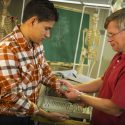Seminars help students break down barriers
Seventeen mostly undergraduate students at UW–Madison are taking a first, grassroots step toward balancing their learning environment in terms of race, ethnicity, gender, sexuality, ability and religion.
As the first to enroll in the Seeking Educational Equity and Diversity (SEED) seminar, the students are plumbing what writer James Baldwin described as the histories we carry within us.
Developed nearly 20 years ago at Wellesley College as a means of developing more inclusive curricula, teaching methods and cultural climate, SEED was adapted in 1999 for UW–Madison faculty and staff by Seema Kapani, diversity education coordinator at the university’s Equity and Diversity Resource Center. This pilot program marks the first time that SEED has been open to undergraduates or offered for academic credit, which is provided by Anne Enke, assistant professor of history and women’s studies, and Michael Thornton, professor of Afro-American studies.
“The seminar is an opportunity for students to talk about privilege and how it affects us all. These silent but powerful influences affect us in ways we don’t allow for or totally flesh out in other classes,” Thornton says.
Thornton teaches an introductory course on contemporary African-American society and an intermediate-level class on how people of color see each other. He says that the SEED seminar nicely dovetails with his other courses.
“It gives me better insights into how I can communicate the idea of “privilege’ better to the privileged students in my classes. SEED really allows for meaningful discussions among students committed to exploring these subjects more fully. The students in SEED want to gain insight into how they can prepare best for the world outside the university,” he says.
One of those students is Amanda Gengler, co-director of student SEED. A master’s candidate in the School of Social Work, she is completing her field placement this semester with Kapani and has been instrumental in developing a seminar for students.
“Student SEED has provided me with a wonderful opportunity to pursue social-justice work at a fundamental level,” she says. “In developing a SEED program for students, we have been able to raise awareness about inequality and to foster resistance to oppression. We also have provided a model for the community that can develop when barriers between people are broken down.”
Gengler’s partner in organizing the seminar is Rodney Yashushi Horikawa, community building coordinator at University Health Services. Horikawa says that student SEED is part of the fabric of the university’s Plan 2008, to enhance diversity among students, faculty and staff.
“SEED is a practical example of the university’s mission: bring together people across campus to co-create and maintain authentically inclusive teaching, learning and working communities. Student SEED — along with SEED for faculty and staff, the Leadership Institute and the Excellence Through Diversity Institute — provides participants with the skills necessary to swim in the deep waters of diversity and plurality,” he says.
The SEED students began earlier this semester by examining how they learned — or didn’t learn — to deal with diversity and connection. From there, they set their own goals for the seminar, following the SEED principle that individuals are the best authorities on themselves.
Gengler discovered that keeping a journal was an important self-discovery tool. She also found that going over the other students’ journals at mid-term deepened and expanded her own insights.
“Hearing students speak to how disconnected they felt prior to the seminar — and how they look forward to sharing a meal, their thoughts and feelings, their new sense of community and belonging, and academically engaging the most crucial, meaningful and difficult topics in society — is incredibly rewarding,” she says.
Student SEED is a work in progress, and its evolution will continue throughout the summer and into the fall, Gengler says.
The UW–Madison Office of the Vice Chancellor for Student Affairs funds student SEED. For information, contact the UW–Madison Equity and Diversity Center, 263-2378, skapani@vc.wisc.edu.

